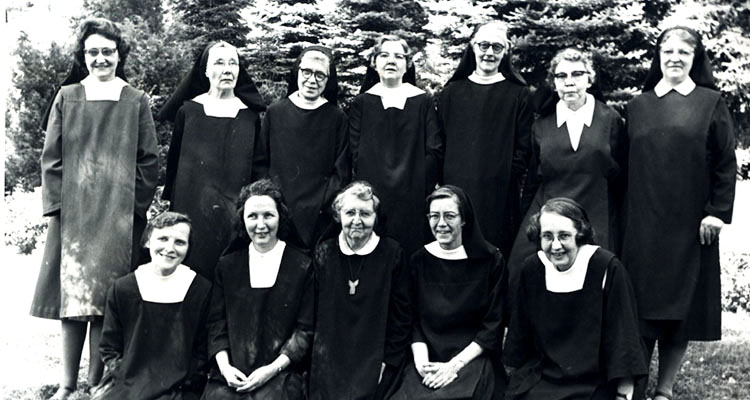Wheeling’s history is intertwined with the Catholic Church. From dozens of schools, parishes and institutions to the oldest hospital in the state and a landmark university, the Catholic faith has touched on all aspects of life in Wheeling over the past 200 years. And just as you can’t tell the story of Wheeling without the Catholic Church, you cannot tell the story of the Catholic Church in Wheeling without highlighting the importance of women religious. It was these Sisters who staffed the parishes, schools, children’s homes, nursing homes and hospital and whose charism continues to shape our faith
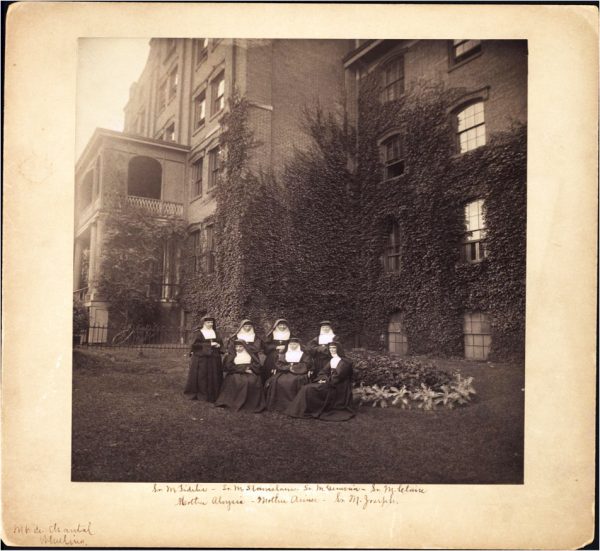
The first women religious to arrive in Wheeling were the Visitandines, whom Bishop Richard Whelan had recruited from the Archdiocese of Baltimore. Six Sisters arrived on April 4, 1848, and took up residence near the Cathedral where just six days later they opened the Wheeling Female Academy with an enrollment of 30 students. The Sisters would later relocate the academy and monastery just outside the city at Mount de Chantal until declining enrollment closed the academy in 2008. For 160 years,the Sisters of the Visitation molded and influenced the lives and faith of more than 6,500 young ladies here in Wheeling. Today, Wheeling’s beloved Visitation Sisters make their home at Georgetown Visitation Monastery in Washington, D.C.
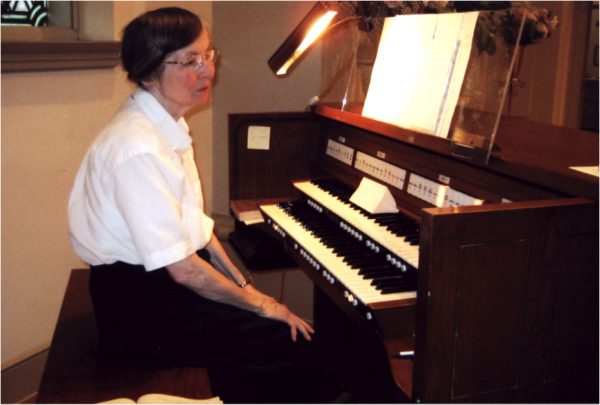
Five years later in 1853, Bishop Whelan would again petition an order of women religious to come to Wheeling. The Sisters of St. Joseph of Carondelet arrived in Wheeling on April 14, 1853, to establish a new community, and within two weeks, the four founding Sisters were staffing Wheeling Hospital, founded by Bishop Whelan three years earlier, eventually staffing four hospitals around the state. During the Civil War, the Sisters nursed wounded and ill soldiers – both Union and Confederate – at the hospital and the Athenaeum prison in downtown Wheeling. The Sisters would also operate an orphanage from the hospital until 1894 when it would relocate to Elm Grove as St. Vincent’s Home for Girls, joining St. John’s Home for Boys – also operated by the Sisters of St. Joseph – and would continue to operate the homes until their merger in 1975.
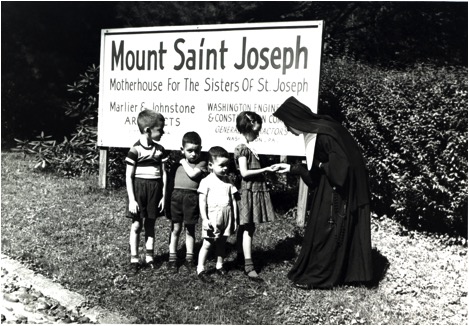
In addition to their hospital and orphanage work, the Sisters were likewise active in Catholic schools, first taking charge of the cathedral parish school in 1865 and eventually staffing 30 schools around the state and in each corner of Diocese. In 1860, they became the first and only religious order to be incorporated in the Diocese, remaining the Congregation of the Sisters of St. Joseph (CSJ) of Wheeling until 2007 when they joined with six other congregations to form the Congregation of St. Joseph.
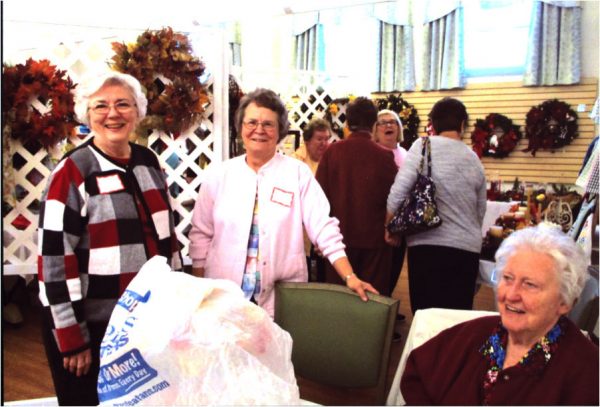
After 165 years, you can still find CSJ Sisters active in service and ministry around Wheeling. The Sisters remain a guiding presence at Wheeling Hospital. Sister Mary DiDomenico – affectionately known as “Sister Di” – is a familiar face around the hospital, volunteering more than 1,500 hours in the past year alone. The Sisters’ motherhouse at Mount St. Joseph is a peaceful and serene setting, befitting of the Sisters continued tradition of love, prayer and support in the Friendly City.
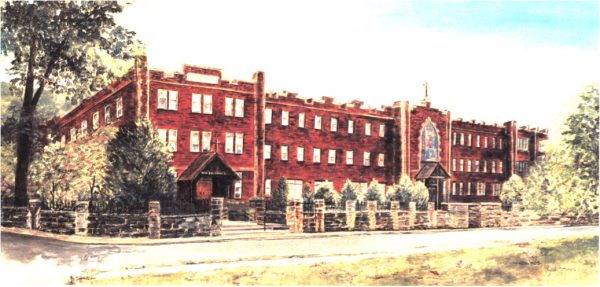
In 1899, Bishop Patrick J. Donahue would invite the Sisters of Our Lady of Charity of Refuge to form a community in Wheeling. The Sisters would establish the Good Shepherd Home for Young Ladies on Edgington Lane in the Edgwood neighborhood of Wheeling where more than 10,000 at-risk young women received care and education without regard for religious affiliation or ability to pay. The school was closed in 1972, and the property transferred to the Diocese to be converted to Good Shepherd Nursing Home, an acclaimed skilled-care arm of the Welty Corporation. Today, the Sisters of Our Lady of Charity of the Good Shepherd maintain a convent at Good Shepherd and remain an active and prayerful presence at the facility.
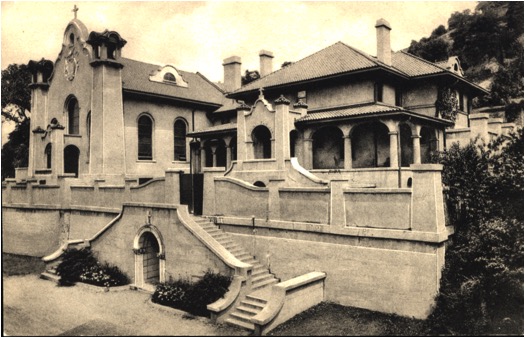
Visible from National Road, one of the more distinctive architectural gems of the Wheeling area is the Mount Carmel Apartments, formerly home to a community of Discalced Carmelite Sisters. Reminiscent of an old Spanish mission, the building was constructed as a monastery for the Sisters in 1917, four years after their arrival in Wheeling under Bishop Patrick J. Donahue. The Carmelite Sisters were a contemplative order, serving God through obedience and prayer, their days consisting primarily of prayer, meditation and work. Until the mid-1960s, they were a cloistered order, rarely leaving the gates of the convent, though the public was invited to the Sisters’ magnificent domed chapel.
As the Sisters advanced in age and vocations declined, in 1975 they were granted an extinctive union with a Carmel in Elysburg, Pa., and departed Wheeling. Sister Angela Pikus, OCD, is the last surviving sister of the Wheeling Carmel, and today makes her home with other Carmelite Sisters in a Danville, Pa., convent. Sr. Angela recalls the many kindnesses of the people of Wheeling and that she continues to receive correspondence from Wheeling residents after having been gone for more than 40 years.
Additional communities of women religious also served the parishes and schools around Wheeling, including the Dominican Sisters, the Felician Sisters, the Franciscan Sisters of Christian Charity, the Marist Sisters, the Sisters of Charity of St. Elizabeth and the Sisters of Divine Providence. Each of these communities contributed to the fabric of the Catholic faith in our city.
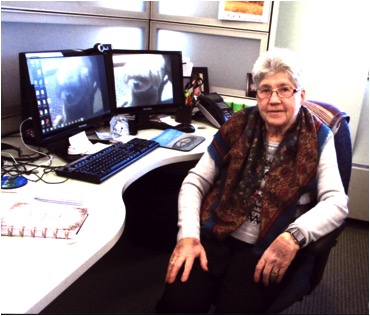
According to Sister Ellen Dunn, a Dominican Sister serving as Delegate for Consecrated Life for the Diocese of Wheeling-Charleston, women religious “are very much the glue holding the people and their faith needs together.” She identifies the Sisters in our Diocese as missionaries of the various congregations, helping to fulfill our needs in the parishes, hospital and health care facilities. For those communities or Sisters no longer in our Diocese, Dunn believes that they “still keep West Virginia with them … many Sisters have simply fallen in love with the People of God in West Virginia.”
Today, there are approximately 100 women religious in the Diocese of Wheeling-Charleston still serving a variety of ministerial roles, nearly half of them right here in the Wheeling area. This author could recount the profound impact on his life by several of our local women religious, including Sister Joanne Gonter, VHM; Sister Mary Palmer, CSJ; and Sister Eva Marie Schlag, CSJ. Their examples of faith, service and selflessness have left an indelible mark on our Diocese and our city.
(Photos provided by Jon-Erik Gilot)
• Jon-Erik Gilot, MLIS, is director of archives and records for the Diocese of Wheeling-Charleston.

Weelunk is proud to have the Diocese of Wheeling-Charleston
as a generous supporter.


